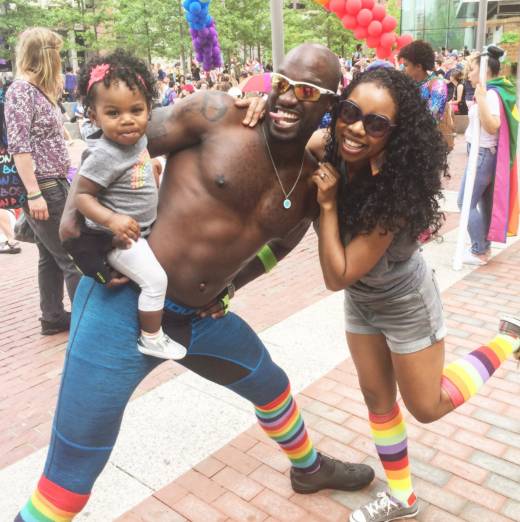He soon learned that wasn't an option.
"I called my dad and said, 'Hey, I haven't ever seen my passport -- I'm sure it’s expired.' He said, 'Let me get back to you.' The next day we met up in person, and he let me know why I couldn't go. He basically said, 'If you leave the country you may not be able to come back.' "
That's because Wusu was born in Nigeria, not the Unites States, as his parents had led him to believe. They entered the country on a visitor visa when he was 3 and stayed illegally.
It wasn't until he was 23 that Wusu found out he was undocumented.
But there was a saving grace. Her name was Maria. She and Wusu met at Stanford and sparks flew. She went on to medical school in Chicago, and when Wusu visited on her birthday and proposed, she accepted.
Then at breakfast the next day, he told her he had some other news.
"So he said, ‘Remember how I thought I would go to Canada to play football?’ " Maria Wusu recalls. "He said, ‘Well it turns out I can't go to Canada. I can't leave the country because, guess what. I'm not a citizen.’ I was like, 'Are you marrying me for a green card?' And he said, ‘No that's the awesome thing. I decided I wanted to marry you, and then I found out that I wasn’t a citizen!’ which kind of goes with his positive outlook on everything."
Wusu joined Maria in medical school, and after they got married he applied for permanent status based on her citizenship.
On March 15, 2013, medical students across the country found out where they’d been accepted to do their residencies. Wusu was on his way to Harvard, and Maria would be across the Charles River at Boston University.
"And then I remember the next morning waking up and there was some mail that we needed to go through. And there was a letter from USCIS -- immigration services," Maria says. "We opened it and it said that our petition to file for citizenship had been denied. Wusu was now in the country illegally and he needed to leave the country immediately. And I remember reading that letter at the kitchen table, and just breaking down and crying and not knowing what to do."
Because Wusu had represented himself as a U.S. citizen -- because he thought he was a U.S. citizen -- the government said he couldn't stay here legally, marriage or no marriage. For once in his life, it was hard to keep a positive attitude.
"There's just been roadblocks at every stage," he says. "It's like I couldn't have done anything better or tried to achieve more -- proven that this is my home, and that I'm here to work and be a positive contributor to society. And so you're like, 'OK, well like I guess America really doesn't want me.' "
But there was one last hope. The Obama administration had just implemented the Deferred Action for Childhood Arrivals policy. DACA allowed Wusu to complete medical school and start his residency.
After President Trump was elected, Wusu decided to reapply for a green card. He hired a lawyer who represents people like him, who unknowingly claimed citizenship falsely. This summer, Wusu got his green card.
Wusu says getting his green card initially felt like a relief. But that relief soon turned to frustration that he'd had to jump through so many hoops to be allowed to continue his schooling and work.
“That kind of sucked," he says. "Was that really necessary to make me feel completely unwelcome, when all I’ve been trying to do all this time is be a positive light in society?”
In a role reversal, this time it’s Maria who’s seeing the bright side -- that they could help other people with their story.
"We both graduated from Stanford," she says. "We both have graduate degrees, have financial resources, and still there were so many barriers to the process. We've spent tens of thousands of dollars. We've misfiled our own paperwork. He's had a lapse in his work permit. So to us, at this point, it's almost unimaginable that people that haven't had all of the privileges that we've had could navigate this system with any chance of being successful."
Next year, the Wusus will be moving back to Palo Alto. He’s accepted a sports medicine fellowship at Stanford.
"Yeah, I'm coming back," he says. "I’ll be taking care of the football team. It’s like a full circle."
Or, you might say, the circle of life.
Liz Gannes is a reporter with our partner 60db, a personalized audio service and app.
